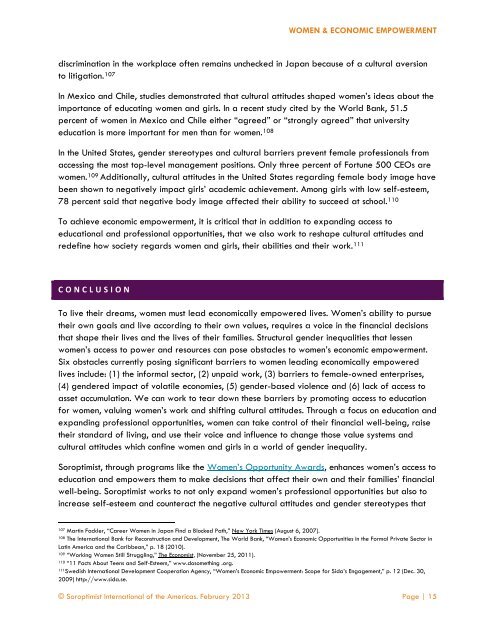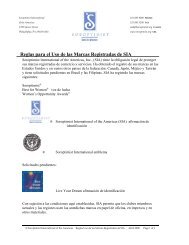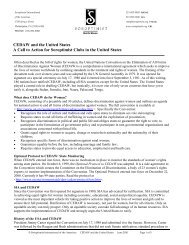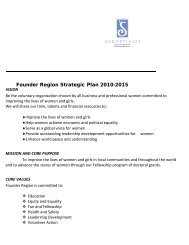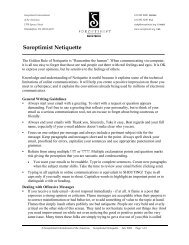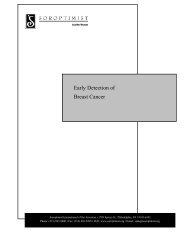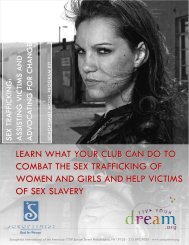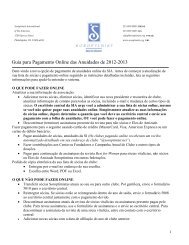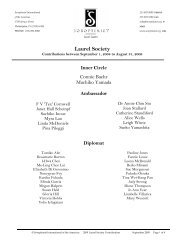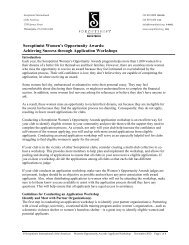Women and Economic Empowerment White Paper - Soroptimist
Women and Economic Empowerment White Paper - Soroptimist
Women and Economic Empowerment White Paper - Soroptimist
You also want an ePaper? Increase the reach of your titles
YUMPU automatically turns print PDFs into web optimized ePapers that Google loves.
WOMEN & ECONOMIC EMPOWERMENT<br />
discrimination in the workplace often remains unchecked in Japan because of a cultural aversion<br />
to litigation. 107<br />
In Mexico <strong>and</strong> Chile, studies demonstrated that cultural attitudes shaped women’s ideas about the<br />
importance of educating women <strong>and</strong> girls. In a recent study cited by the World Bank, 51.5<br />
percent of women in Mexico <strong>and</strong> Chile either “agreed” or “strongly agreed” that university<br />
education is more important for men than for women. 108<br />
In the United States, gender stereotypes <strong>and</strong> cultural barriers prevent female professionals from<br />
accessing the most top-level management positions. Only three percent of Fortune 500 CEOs are<br />
women. 109 Additionally, cultural attitudes in the United States regarding female body image have<br />
been shown to negatively impact girls’ academic achievement. Among girls with low self-esteem,<br />
78 percent said that negative body image affected their ability to succeed at school. 110<br />
To achieve economic empowerment, it is critical that in addition to exp<strong>and</strong>ing access to<br />
educational <strong>and</strong> professional opportunities, that we also work to reshape cultural attitudes <strong>and</strong><br />
redefine how society regards women <strong>and</strong> girls, their abilities <strong>and</strong> their work. 111<br />
CONCLUSION<br />
To live their dreams, women must lead economically empowered lives. <strong>Women</strong>’s ability to pursue<br />
their own goals <strong>and</strong> live according to their own values, requires a voice in the financial decisions<br />
that shape their lives <strong>and</strong> the lives of their families. Structural gender inequalities that lessen<br />
women’s access to power <strong>and</strong> resources can pose obstacles to women’s economic empowerment.<br />
Six obstacles currently posing significant barriers to women leading economically empowered<br />
lives include: (1) the informal sector, (2) unpaid work, (3) barriers to female-owned enterprises,<br />
(4) gendered impact of volatile economies, (5) gender-based violence <strong>and</strong> (6) lack of access to<br />
asset accumulation. We can work to tear down these barriers by promoting access to education<br />
for women, valuing women’s work <strong>and</strong> shifting cultural attitudes. Through a focus on education <strong>and</strong><br />
exp<strong>and</strong>ing professional opportunities, women can take control of their financial well-being, raise<br />
their st<strong>and</strong>ard of living, <strong>and</strong> use their voice <strong>and</strong> influence to change those value systems <strong>and</strong><br />
cultural attitudes which confine women <strong>and</strong> girls in a world of gender inequality.<br />
<strong>Soroptimist</strong>, through programs like the <strong>Women</strong>’s Opportunity Awards, enhances women’s access to<br />
education <strong>and</strong> empowers them to make decisions that affect their own <strong>and</strong> their families’ financial<br />
well-being. <strong>Soroptimist</strong> works to not only exp<strong>and</strong> women’s professional opportunities but also to<br />
increase self-esteem <strong>and</strong> counteract the negative cultural attitudes <strong>and</strong> gender stereotypes that<br />
107<br />
Martin Fackler, “Career <strong>Women</strong> in Japan Find a Blocked Path,” New York Times (August 6, 2007).<br />
108<br />
The International Bank for Reconstruction <strong>and</strong> Development, The World Bank, “<strong>Women</strong>’s <strong>Economic</strong> Opportunities in the Formal Private Sector in<br />
Latin America <strong>and</strong> the Caribbean,” p. 18 (2010).<br />
109<br />
“Working <strong>Women</strong> Still Struggling,” The Economist, (November 25, 2011).<br />
110<br />
“11 Facts About Teens <strong>and</strong> Self-Esteem,” www.dosomething .org.<br />
111<br />
Swedish International Development Cooperation Agency, “<strong>Women</strong>’s <strong>Economic</strong> <strong>Empowerment</strong>: Scope for Sida’s Engagement,” p. 12 (Dec. 30,<br />
2009) http://www.sida.se.<br />
© <strong>Soroptimist</strong> International of the Americas. February 2013 Page | 15


